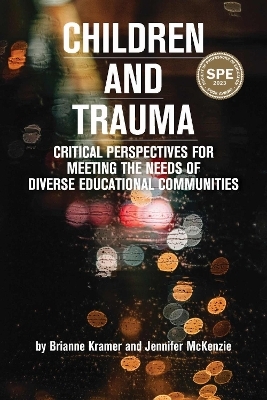
Children and Trauma
Myers Education Press (Verlag)
978-1-9755-0343-7 (ISBN)
According to the American Psychological Association (APA, 2015), trauma is an emotional response to a terrible event, which can lead to difficulties with emotional regulation, social relationships, and the development of physical symptoms. Traumatic experiences may include physical or sexual abuse, neglect, experiencing or witnessing violence, war, suicides, and disasters. Because of the prevalence of students with traumatic experiences in K-12 schools, development and use of trauma-informed practices (TIP) is currently increasing in educational spaces across the United States as educators and others who work with children become more aware of how socio-emotional development and exposure to trauma places children on a pathway through adulthood. Because of growth in these areas, it is important for educators and others who work with children to have a resource to consult. Children and Trauma: Critical Perspectives for Meeting the Needs of Diverse Educational Communities provides teachers, administrators, and others involved in education with an understanding of trauma-informed practices and explains how they can be used in the classroom. Additionally, school districts could utilize this text to implement professional development, particularly if they are considering creating a districtwide trauma-informed system.
Brianne Kramer, (Ph.D. in Social Foundations of Education with a minor in Educational Psychology from the University of Toledo) is an Assistant Professor of Education in the College of Education and Human Development at Southern Utah University, where she teaches undergraduate and graduate-level Social Foundations of Education and Educational Research courses. Her research interests include issues of privilege, identity, and resistance in teacher education programs, educational policy, trauma-informed practices in the classroom, and teacher activism. Jennifer M. McKenzie, (Ph.D. in SpecialEducation - Behavioral Disorders from the University of Missouri) is an Assistant Professor of Special Education and the Special Education Program Director in the Department of Teacher Education within the College of Education and Human Development at Southern Utah University. She is currently engaged in research to create a coaching model in the use of evidence-based trauma-informed classroom management practices for classroom teachers.
Acknowledgments
Introduction
Chapter 1: A Bioecological Model for School-Based Trauma Informed Practice-Theresa Kruczek
Chapter 2: Trauma, Adversity, and the Classroom Teacher: Systematically Planning for Safety and Resiliency-Doyle Pruitt and Peter Kozik
Chapter 3: Integrated Theories for Integrated Childhoods: How Bioecological Systems Theory and Relational Cultural Theory Shape Trauma-Informed Care in Schools-Joel Arvizo-Zavala, Yifat Levenstein, and Amira Trevino
Chapter 4: Ensuring the Success of Young Children: Trauma-Informed Practice in the Preschool Classroom-Marla J. Lohmann, Johanna P. Higgins, and Jennifer Rossman
Chapter 5: Understanding the Impact of Trauma on School-Age Children and Their Families-Jennifer Foster and Aneesh Kumar
Chapter 6: Helping the Helpers in Education-Jody A. Kunk-Czaplicki and R. Jason Lynch
Chapter 7: Research and Teaching Methods for Children Who Have Experienced Trauma-Meghan Kessler and Michele Miller
Chapter 8: Relationship Over Reproach: One School’s Efforts in Fostering Resilience Through Trauma-Informed Practices-Carrie Giboney Wall
Chapter 9: A Trauma-Informed School District Case Study: Iron County School District-Maren Hirschi and Shawn Christiansen
Chapter 10: Strategies to Meet the Needs of Students with Trauma-Natalia Assis, Mark Reid, Angela Proctor, and Thomas Brooks
Chapter 11: The Impact of Trauma on Rural Communities-Susanne James, Anni Reinking, and Jayme Swanke
Chapter 12: Trauma’s Impact on Urban School Districts: An Action Plan for Educators-Jennifer Hernandez
Chapter 13: The Need for a New Trauma-Informed Framework: Integrating Social Justice Education-Brianne Kramer
Chapter 14: rACEism: Addressing Adverse Childhood Experiences (ACEs) of African American Youth in K–12 Education and Beyond-Laura Danforth, John W. Miller, Jr., and Jaqueline Burse
Chapter 15: Indigenous Methodologies for Teaching in a Trauma-Informed Health Education Program-Sarah Allen, Rae Deernose, Alma Knows His Gun McCormick, Shannen Keene, Brianna Bull Shows,John Hallett, Mark Schure, Suzanne Held, and Christiane Parrish
Chapter 16: Blurred Lines: Trauma and Educational Disability-Jennifer M. McKenzie
Chapter 17: Responding to Trauma: Considerations of Attachment of Youth in Foster Care-Amanda Hill
Chapter 18: A Call to Action: Recommendations for Teacher Advocacy in the Aftermath of 2020-Brianne Kramer, Jennifer M. McKenzie, and John Rodari Meisner
Conclusion
Editor and Author Biographies
Index
| Erscheinungsdatum | 06.05.2022 |
|---|---|
| Reihe/Serie | Educational Psychology: Meaning Making for Teachers and Learners |
| Sprache | englisch |
| Maße | 149 x 226 mm |
| Gewicht | 505 g |
| Themenwelt | Medizin / Pharmazie ► Medizinische Fachgebiete ► Notfallmedizin |
| Sozialwissenschaften ► Pädagogik ► Allgemeines / Lexika | |
| Sozialwissenschaften ► Pädagogik ► Didaktik | |
| ISBN-10 | 1-9755-0343-0 / 1975503430 |
| ISBN-13 | 978-1-9755-0343-7 / 9781975503437 |
| Zustand | Neuware |
| Haben Sie eine Frage zum Produkt? |
aus dem Bereich


